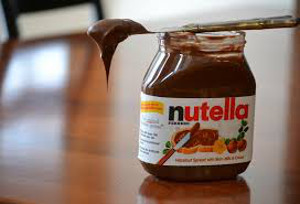 mpany Nutella celebrated its 50th anniversary in Alba last month. Its founder, Pietro Ferrero, who was an Alba-based pastry cook, decided to employ his entrepreneurial nous just after the second world war to combat the impunity one associates with Italian neorealism.
mpany Nutella celebrated its 50th anniversary in Alba last month. Its founder, Pietro Ferrero, who was an Alba-based pastry cook, decided to employ his entrepreneurial nous just after the second world war to combat the impunity one associates with Italian neorealism. The premise behind his single product was that in the north of Italy nuts are plentiful, and cocoa beans are scare, so the classic nut-and-chocolate combination should be produced in a way that's heavier on nuts and lighter on chocolate.
The profitability of the company rose exponentially in the early years: in 1946 Pietro Ferrero and his brother Giovanni produced and sold 300kg of their speciality. Nine months later output had increased to 10 tonnes. Pietro stayed at home making the spread; Giovanni travelled to markets all across Italy in his car. In 1948 Ferrero, had become a private limited company, and had relocated to a 5,000 square metre factory equipped to produce 50 tonnes of gianduiotto (hazelnuts and cocoa) a month.
The company now sells 365,000 tonnes of Nutella per annum worldwide, with the Germans, French, Italians, and Americans being the biggest consumers. The anniversary occasioned, of course, an extravagant promotional operation: there was a formal gathering in Rome in May, which had two government ministers in attendance, including the minister for trade and employment, Federica Guidi, who remarked that Nutella is "an emblem of Italian entrepreneurial spirit." Journalists received a 1kg jar labelled with the date and a commemorative Italian postage stamp. It is an ideal opportunity for the Ferrero company – which also owns the Tic Tac, Ferrero Rocher, Kinder and Estathé brands, among others – to emphasise its values and decorated, romantic narrative.





